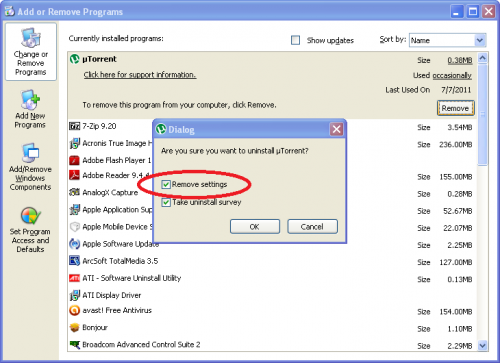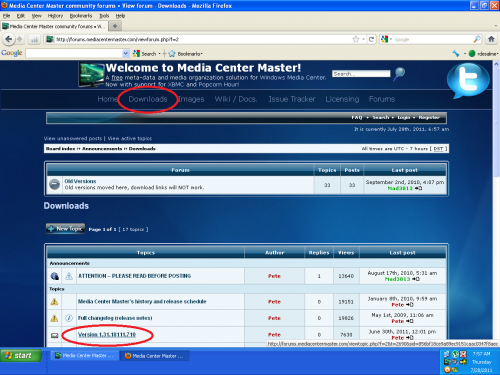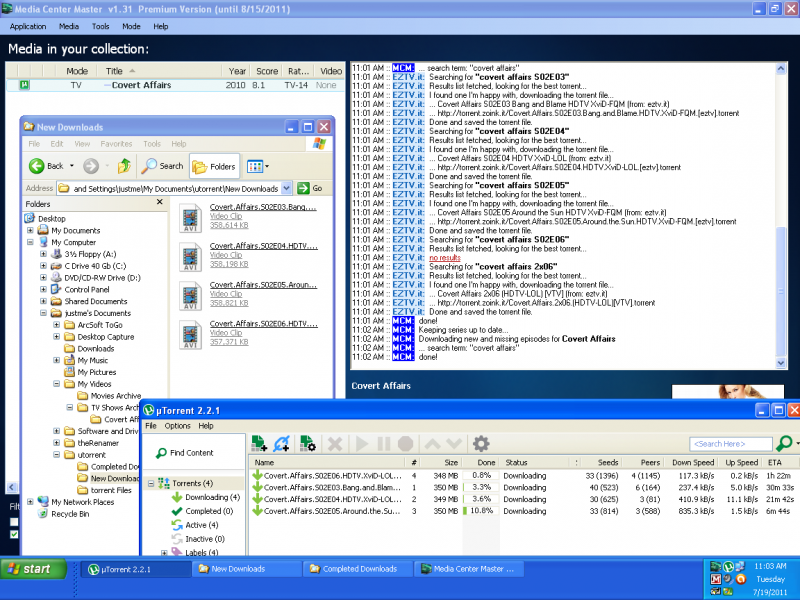Media Center Master's Wiki Editing Guide
This Wiki uses MediaWiki Software for it's operating platform. Individuals wishing to contribute are encouraged to consult the MediaWiki Help:Contents page for information on using the MediaWiki Software. It contains several helpful guides with examples for readers, editors, moderators, and system admins.
- Permissible material in the form of writings and images should be: creations made by the editor, or acquired from an open source having no copyright license.
- The use of copyrighted material is strictly prohibited; not allowed without, proper permission from the legal entity owning such source, and prior notice to Media Center Master's owner for displaying approval.
Intended Purpose and Requirements
This is a work in progress, please be patient.
The intended purpose of this page is to provide information to all individuals, readers, and editors on some common editing practices used in this wiki. It, also, attempts to demystify the enter workings of a wiki for those thinking about, or wishing to edit, or contribute material to the wiki, but are hesitant because of a lack of knowledge, and/or experience in a wiki enviroment.
This Wiki has an open registration for all individuals of the community. The only requirement to register is: an individual must have an active email account. Registration is required to edit and contribute relevant information pertaining to Media Center Master, such as, and not just limited to: Installation, Graphical User Interface Descriptions, Common Usage (Real Life) Configuration Scenarios, Technical Guides, Networked Configurations, Interfacing with Other Media Center Programs and/or Products...
Contents
Terms and Definitions
The terms and definitions listed below will apply for the purposes in this guide.
- editor/s - registered user/s to the Media Center Master's Wiki, reader/s who is able to log in and edit the wiki.
- individuals - persons who are new to this environment.
- markup - specific syntax, keyboard characters, used to format wiki pages and text.
- reader/s - unregistered individual who primarily reads the wiki.
- wikitext - the viewable text an individual will see to read in a wiki with markups to produce page layouts and format the text.
Some Basics on How Wiki Software Works
Contributing editors should keep in mind: the Wiki is not just serving the Media Center Master Community as a Reference Guide, it also, introduces Media Center Master to the world, through the internet; therefore, all material for contributions should be constructed in a professional manner.
Unlike word processing programs (e.g., MicroSoft Office Word, OpenOffice.org Writer), Wiki software uses code, know as: markup, for formatting the text and structuring the outline of the document as a complete package. The text with markup, also known as: WikiText,1 is entered in by the editor. Readers only see the formatted text in an outline structure, as defined in the wikitext, by the editor.
All saved edits become readily available for viewing, immediately, on the internet, for the world to read, copy, and for other editors to make revisions. If an editor does not wish to leave a contribution open, requiring no prior consent for: reproduction, revisions by minor and/or major editing; the editor should not contribute material to the Wiki.
The Wiki cannot be broken, messed up, beyond repair. Each edit is monitored by the software (down to a simple change of a single letter, a period...), and the editor's user name is attached to the history record of the page's edit. Each time a revision to a page is saved the editor's keystrokes are recorded and are available for undoing an edit.
There is no specific page for a new editor to practice (i.e., a "sandbox" to play in). However, each editor is provided two (2) empty pages under his/her account.
- These pages are formatted in the same manner as any of the other pages in the wiki.
- They can contain headings, links to other pages...
- The first page is titled with the editor's chosen "user name," and can be found after logging in at the top right of the "Main Page," in red text (red text indicates an empty page and blue text indicates the page contains material).
- This page is visible to all individuals through the "Special Pages" link listing all wiki members.
- It is a place where an editor my wish to put a short autobiography, meaningful quotes, state reasons for joining...
- The second page is titled, "my talk," and can be found after logging in just to the right of the editor's "user name" page, also in red text.
Minor editing of spelling, punctuation, and grammar may be made directly to the page containing the errors. For Major edits, it is suggested to use the editor's "my talk" page for editing a copy of the area requiring updating, then paste a finish copy of the edit back to the area in order to update the Wiki.
1 This link is listed in the MediaWiki Handbook link under, Section 2 Handbook parts, 2.2 For editors, Formatting.
Examples to Use for This Wiki
Information Boxes
GENERAL NOTICE BOX
A copy and paste of this example:
<blockquote><blockquote><blockquote style="border: solid thin grey;"> *''"My Videos", "TV Series Archive" and "Movies Archive" folders are for illustration purposes of a model "Folder Structure."'' *''The "My Videos" folder is not necessary and used here only to house the other two folders.'' *''Although the "Movies Archive" folder is shown in these examples, it will not be used anywhere else in these guides.'' *''These guides will only use the "TV Series Archive" folder in dealing with TV Series Episode downloading, processing, and parsing.'' </blockquote></blockquote></blockquote>
Will produce a grey, thin line, box, with a bullet outline style, using an italics type font.
- "My Videos", "TV Series Archive" and "Movies Archive" folders are for illustration purposes of a model "Folder Structure."
- The "My Videos" folder is not necessary and used here only to house the other two folders.
- Although the "Movies Archive" folder is shown in these examples, it will not be used anywhere else in these guides.
- These guides will only use the "TV Series Archive" folder in dealing with TV Series Episode downloading, processing, and parsing.
SPECIFIC NOTICE BOX
A copy and paste of this example:
<blockquote><blockquote><blockquote style="border: solid medium grey;"> *''This is the '''<u>first step of three part outlined process</u>''' to configuring settings for the transparent effect.'' *''By disabling these options, the torrent will start downloading automatically and no pop-up windows will appear.'' </blockquote></blockquote></blockquote>
Will produce a grey, medium thickness line, box, with a bullet outline style, using an italics type font.
- This is the first step of three part outlined process to configuring settings for the transparent effect.
- By disabling these options, the torrent will start downloading automatically and no pop-up windows will appear requiring user acknowledgements.
ACKNOWLEDGEMENT BOX
A copy and paste of this example:
<blockquote><blockquote><blockquote><blockquote><blockquote style="border: solid medium grey;"> '''The intended purpose of this section is for it to be used as a complete manual.''' </blockquote></blockquote></blockquote></blockquote></blockquote>
Will produce a grey, medium thickness line, box, with no outline style, using a bold, regular, type font.
The intended purpose of this section is for it to be used as a complete manual.
WARNING BOX
A copy and paste of this example:
<blockquote><blockquote><blockquote><blockquote><blockquote style="border: solid medium black;"> *'''<u>Do not use</u>, this guide, <u>unless</u>, the user followed the Table of Contents.''' *'''Using these steps in any other manner <u>will not reproduce</u> what is shown in the examples.''' </blockquote></blockquote></blockquote></blockquote></blockquote>
Will produce a black, medium thickness line, box, with a bullet outline style, using a bold, regular, type font.
- Do not use, this guide, unless, the user followed the Table of Contents.
- Using these steps in any other manner will not reproduce what is shown in the examples.
Image Links
INCORRECT WIKITEXT MARKUP FOR IMAGE LINK
- There must be an empty line space between the last line of text and the image link for the image to be located: below the text, and to the far left of the page.
- If there is not an empty line space between the last line of text and the image link, the image will be located directly after the last word in the text.
Having text directly above an image link, will produce this: [[File:14.utorrent.remove.settings.png|500px]]
Having text directly above an image link, will produce this:

REGULAR SIZE SCREEN SHOTS OF A CROPPED IMAGES
A copy and paste of this example:
[[File:14.utorrent.remove.settings.png|500px]]
Will produce an image of this size.
REGULAR SIZE SCREEN SHOT OF A COMPLETE DESKTOP IMAGE
A copy and paste of this example:
[[File:18.mcm.current.ver.download.png|500px]]
Will produce an image of this size.
OVER SIZE SCREEN SHOT FOR VIEWING DETAILS IN COMPLETE DESKTOP IMAGE
A copy and paste of this example:
[[File:53.mcm.start.of.1st.run.png|800px]]
Will produce an image of this size.




